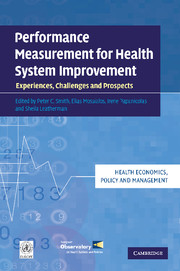Book contents
- Frontmatter
- Contents
- Foreword
- Acknowledgements
- List of contributors
- List of boxes, figures and tables
- Part I Principles of performance measurement
- Part II Dimensions of performance
- Part III Analytical methodology for performance measurement
- 3.1 Risk adjustment for performance measurement
- 3.2 Clinical surveillance and patient safety
- 3.3 Attribution and causality in health-care performance measurement
- 3.4 Using composite indicators to measure performance in health care
- Part IV Performance measurement in specific domains
- Part V Health policy and performance measurement
- Part VI Conclusions
- Index
3.4 - Using composite indicators to measure performance in health care
Published online by Cambridge University Press: 06 July 2010
- Frontmatter
- Contents
- Foreword
- Acknowledgements
- List of contributors
- List of boxes, figures and tables
- Part I Principles of performance measurement
- Part II Dimensions of performance
- Part III Analytical methodology for performance measurement
- 3.1 Risk adjustment for performance measurement
- 3.2 Clinical surveillance and patient safety
- 3.3 Attribution and causality in health-care performance measurement
- 3.4 Using composite indicators to measure performance in health care
- Part IV Performance measurement in specific domains
- Part V Health policy and performance measurement
- Part VI Conclusions
- Index
Summary
Introduction
Health-care performance is multi-dimensional and not easily captured by a single measure. Aspects of performance such as efficiency, quality, responsiveness, equity, outcomes and accessibility are all legitimate interests for the public and the policy-maker (Institute of Medicine 2001). It is not surprising therefore that there has been an explosion of interest in the generation, publication and interpretation of performance information in the health-care domain across the world, facilitated by the availability of information technology that allows for the capture of large amounts of complex data. This has occurred at all levels – whether individual practitioner, specific health services, health plans of provider organizations or entire health systems. However, the very abundance of such information can obscure users and policy-makers' ability to make overall judgments about relative performance. Complex information presented over many dimensions may be difficult to comprehend and a lack of transparency presents opportunities for poor performance to go undetected. Users faced with multiple and disparate performance information will need to weigh the evidence and make trade-offs between different performance dimensions, thus increasing their processing burden. Some users may base decisions on a single performance dimension simply because it is the most clear. However, this will not necessarily be the most important.
In response to such issues, the use of summary or composite measures has become widespread in health and social policy arenas (Freudenberg 2003; Nardo et al. 2005). Such measures seek to combine disparate indicators of performance into a single score or index which can be used to compare (and sometimes rank) the relative performance of individuals, organizations or systems.
- Type
- Chapter
- Information
- Performance Measurement for Health System ImprovementExperiences, Challenges and Prospects, pp. 339 - 368Publisher: Cambridge University PressPrint publication year: 2010
- 5
- Cited by



